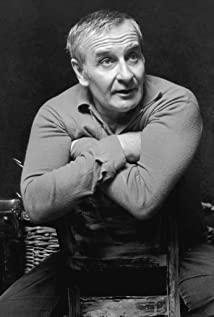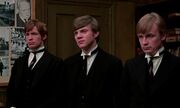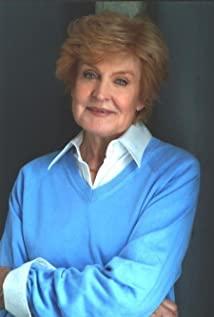-
Mick Travis: What stands, if freedom falls? Who dies, if England lives?
-
Headmaster: Those who are given most also have most to give.

Lindsay Anderson
Lindsay Anderson (Lindsay Anderson, April 17, 1923-August 30, 1994), was born in Karnataka, Bangalore, India. He is a British director, screenwriter, and producer.
In 1948, directed his first documentary "Meet the Pioneers". In 1954, directed the documentary short film "Thursday’s Children"
[1]
, which won the Oscar for Best Documentary (Short Film) Award. In 1957, directed the documentary "Every Day Beyond Christmas"
[2]
. In 1963, directed the feature film " This Sporting Life "
[3]
, which was nominated for the main competition unit of the 16th Cannes International Film Festival
[4]
. In 1968, directed the feature film "If"
[5]
, the film won the 22nd Cannes International Film Festival-the Palme d’Or
[6]
, he was nominated for the 22nd British Academy Film Awards Film Award-Best Best Director Award
[7]
. In 1973, directed the fantasy comedy film " O Lucky Man! "
[8]
, which was nominated for the main competition unit of the 26th Cannes International Film Festival
[9]
. In 1979, the drama film "The Old Crowd" directed by him was released. In 1982, directed the comedy film "The Hospital of Great Britain"
[10]
, which was shortlisted for the main competition unit of the 35th Cannes International Film Festival
[11]
. In 1987, directed the drama film " As Baleias de Agosto "
[12]
. In 1993, directed the comedy movie "Is That All There Is?".
On August 30, 1994, Lindsay Anderson died of a heart attack in Dordogne, France, at the age of 71.
Character Evaluation
In the movie "This Sporting Life", Lindsay Anderson does not simply portray the protagonist, but portrays the protagonist's spiritual world, and at the same time truly and accurately restore the surrounding environment and create typical and distinctive characters. In the process of the film’s objective and calm narration, people can see Anderson’s cognition of objective realism, through specific events and the protagonist’s subjective emotional development to promote a presentation of the real world cognition, and through sudden violence. The accumulation of the protagonist’s anger reaches its culmination and turns into despair. Moreover, his films fully demonstrate the characteristics of British free films that are concerned with social issues and satirize the dark reality, reflecting the social reality and expressing dissatisfaction with the social status quo through objective and meticulous descriptions of people of different classes and different occupations. As a representative of the free film movement, Anderson has also assumed social responsibility through his works
.
Extended Reading













